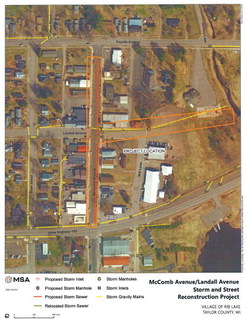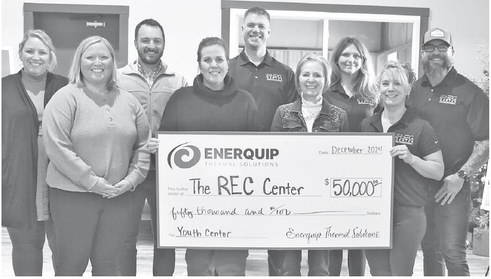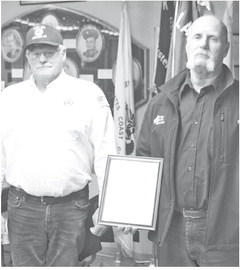Rib Lake village to seek grant for downtown road work


The Rib Lake Village Board at its meeting on May 13 voted to apply for Community Development Block Grant-Public Facilities (CDBG-PF) funding for the McComb Avenue and Landall Avenue street and storm sewer reconstruction project. Jeff Seamandel from MSA Professional Services told the board he has been working with public works director Tom Olson to prepare costs estimates for reconstructing the storm sewer at the intersection of McComb Avenue and Landall Avenue. He said the storm sewer at this location is in “bad condition” and that a sinkhole had recently developed near the intersection.
The project along McComb Avenue would include new street reconstruction from building front to building front, including new asphalt pavement, curb and gutter, concrete sidewalks, and new concrete storm sewer. Adding additional storm sewer along McComb Avenue will provide better drainage along the street and will fix the storm sewer problems at the intersection with Landall Avenue. The project along Landall Avenue includes replacing the storm sewer along Landall Avenue from the intersection with McComb Avenue down to Tannery Creek. Currently the storm sewer at this location is in “bad condition” and is undersized. The project includes street reconstruction along Landall Avenue from McComb Street to Mill Lane. This includes new asphalt pavement, curb and gutter and concrete sidewalks on both sides of Landall Avenue. The project also includes reconstructing the gravel parking area east of Mill Lane and complete restoration within the village park area.
Seamandel said MSA has recently been in contact with the Department of Administration in Madison which administers the federal program to determine if the department considers the McComb Avenue/Landall Avenue project as a “community wide” project. He said MSA was notified by the department on April 15 that they do consider the project a “community wide” project, which means Rib Lake will be able to apply for a CDBG-PF grant without having to complete income surveys to show that over 51 percent of the residents are low or moderate income.
Seamandel said if the CDBG-PF grant is awarded, it would provide up to 67 percent of the project costs up to $1,000,000. He said the grant determination is based upon how many projects are submitted and how much money is available at the time of the awards. Seamandel said the Department of Administration changed its funding rules a few years ago. He said previously they would fund 50 percent of the project cost up to $500,000. Seamandel said the department’s emphasis now is to fund fewer, but larger project.
The total project cost is estimated at $1,102,526 including construction, engineering, grant application/ administrative fees and contingencies. If Rib Lake received the grant, the village’s share of the cost would be somewhere in the $400,000 range. Seamandel said the estimate for the project will increase since at the time he prepared it, he was unaware there was concrete underneath the asphalt on McComb Avenue, which will be more expensive to remove. Despite that, Seamandel said he felt the portion of the project funded by the grant should still be below the $1,000,000 threshold.
Grant applications are due June 25. The application fee is $8,000 and there is no guarantee that Rib Lake will receive a grant. Grants will be announced in August. Seamandel said if a grant is awarded, MSA could begin the topographic survey (field work) this fall and complete the project design work this winter. Bidding and construction could take place in the spring of 2021 with the project being completed by fall of that year.
If Rib Lake is not awarded a grant during this funding cycle, Seamandel said the village has the option to reapply next year and pay another application fee. He said if it is determined that the storm sewer must be reconstructed along Landall Avenue next year, MSA will work with the village to complete the design this fall and bid the project out to contractors next spring. The total project cost of the Landall Avenue project is estimated at $277,544, including construction, engineering and contingencies. Seamandel said since this project is significantly lower in cost compared to the McComb Avenue/Landall Avenue Street and Storm Sewer Project, the likelihood of obtaining CDBG funding for this portion of the work is “slim” due to the Department of Administration’s “fewer but larger” preference. He said Rib Lake would be responsible for the entire cost.
Trustee Russ Bullis said in looking at the aerial view, the project included running storm sewer along the entire length of McComb Avenue, as well as replace the storm sewer along Landall Avenue [earlier discussions included bypassing the Landall storm sewer]. Seamandel said the decision was made to include Landall because it would allow for faster removal of storm water from McComb than for everything to flow down to Hwy 102. Secondly, he said, they don’t know yet if the Department of Transportation will permit the village to connect to the storm sewer along Hwy 102. In that case, Seamandel said, MSA would have to make the water from the south end of McComb Avenue flow north to Landall and then east to Tannery Creek.
While it would cost the village less money to just replace the storm sewer along Landall Avenue, the board felt something needed to be done about McComb Avenue since it was the oldest unreconstructed street in the village and at one time served as Hwy 102. They cited continuing problems with the street, including broken out curb and gutter along the street and the sidewalk by the grocery store.
In the end, the board decided to pursue CDBG-PF funding for the large, more expensive project. Both Seamandel and Pat Morrow, also from MSA who was at the meeting to update the board on the plan to install a cover on the sludge storage tank, agreed. Both said they had worked on a number of projects involving CDBG funding and felt it was the best source of grant funding available for this type of project.
Sludge tank cover
Earlier in the meeting, Morrow updated the board of the plan to install an insulated aluminum dome cover on the sludge storage tank to help eliminate some of the freezing the tank experienced this past winter. He said while the freezing has been able to be mitigated to some extent with some operational changes, the Department of Natural Resources (DNR) has indicated Rib Lake can use unused project contingency funds from the sewer plant project to install the dome cover. Morrow said Rib Lake’s attorney also concluded that the village could issue a change order and have Staab perform the work as an addition to the original project contract.
Morrow said there are also other small, related modifications planned for the storage tank, such as installation of duckbill check valves on the sludge discharge pipe outlets, adding diffused aeration under the telescopic valve, and adding insulation to the exposed exterior concrete wall. He said 4 inches of spray foam up to a depth of 12 inches below grade would be added to the outside wall of the tank and covered with three coats of ultraviolet (UV) protection. Morrow said each coat of UV protection should last approximately seven years. He added rodents don’t normally chew on or burrow into the insulation, but that birds will occasionally peck at it and the village will have to watch for that.
The estimated total cost — including design and construction engineering — for all the planned modifications to the sludge storage tank is $159,800. Morrow said there is $300,000 in contingency funds left over from the original sewer plant project that Rib Lake can use to cover that cost.
Bullis asked about condensation forming on the inside of the cover and causing rust and corrosion. Morrow replied that shouldn’t be a problem. He said the cover will be constructed of aluminum, the piping in the tank is made of coated steel and the telescoping value is constructed of stainless steel. He said it would be a problem if there was some sort of mechanical equipment in the tank, but since there isn’t, rust and corrosion is not going to be a problem.
Morrow said while the modifications wouldn’t completely prevent the sludge in the tank from freezing, they would help to reduce the severity of the freezing. The board agreed and approved implementing the proposed modifications.
Bids approved
The board approved a crack sealing bid of $1.23 per pound from Lakes Asphalt. Total cost to crack seal the various streets around the village was $16,937. One of the streets on the list was McComb Avenue. Since the village was going to apply for grant funding to replace the street, the board decided not to crack seal McComb Avenue this year, reducing the total cost of crack sealing to $14,758.
The board approved a bid of $32,158 from American Asphalt to resurface Tannery Lane. The village will receive $8,500 under the Local Roads Improvement Program (LRIP) to cover part of the cost. The board also approved a bid of $74,383 from American to resurface both West and High streets.
Money for the crack sealing and resurfacing projects would come from the street’s fund in the budget.
Campground open
The board voted to open the campground at Lakeview Park with restrictions. The playground will remain closed. Since the village doesn’t have a caretaker for the campgrounds and the bathrooms would need to be cleaned and sanitized daily, the bathrooms will remain closed as well. The board felt this wouldn’t be a problem because most camper units had their own bathroom and shower.
Trustee Vernell Van Hecker asked about people who had pop-up campers or camped in tents. Following a brief discussion, the board decided to put a sign up at the entrance to say the campground was only open to self-contained camper units due to the bathrooms being closed.

Aerial photograph showing the location of the McComb Avenue and Landall Avenue street and storm sewer reconstruction project.



